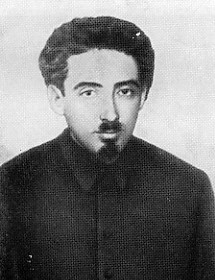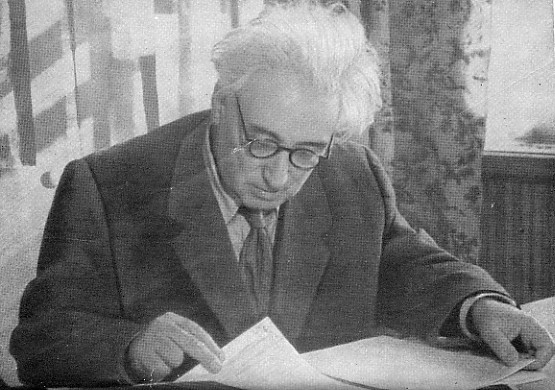presents
 Libedinsky, Yuri Nikolaevich. Born 10 December 1898 in Odessa, but soon the family moved to the Urals where his father was a factory doctor. He attended the Chelyabinsk secondary school. He joined the Communist Party in 1920 and served as a political commissar in the Red Army during the Civil War.
Libedinsky, Yuri Nikolaevich. Born 10 December 1898 in Odessa, but soon the family moved to the Urals where his father was a factory doctor. He attended the Chelyabinsk secondary school. He joined the Communist Party in 1920 and served as a political commissar in the Red Army during the Civil War.Libedinsky's first novel, Nedelya ("A Week") (1922), concerning Communists caught up in a peasant rebellion in a remote town in the Urals, was one of the first significant works of the young Soviet literature and made Libedinsky an instant star. N.I. Bukharin wrote an article in Pravda, praising the work and calling Libedinsky "the first swallow" of the new proletarian literature. While essentially realistic, A Week also shows some influence of Bely in frequent lyrical passages. It tells the story mainly through individual portraits of the various characters. The Communists are show as human, having their own failings and doubts. Some are mere self-servers, who joined the Party only to secure a comfortable position for themselves. The novel exposes a profound failing in the structure of the Party, which results in those who are good in speech-making being advanced over those who actually understand the peasants and know how to run the factories. The work is also frank in its portrayal of the deep and intense hatred the peasants had for the Bolsheviks and how tenuous was the Soviet grasp on power. In the end, while the revolt is put down, most of the leading Communists in the town are brutally murdered. Following the success of The Week, Libedinsky joined the "October" literary group, which was founded at the end of 1922. It had 100% pure Communist membership and came out in defense of ideologically pure proletarian literature. The Artistic Platform of "October" declared: That literature is proletarian which organizes the psychology and consciousness of the working class and of the wide toiling masses toward the final aims of the proletariat as the reorganizer of the world and the creator of Communist society.The group, however, refused to endorse any one particular form. Libedinsky also became a prominent leader in RAPP. Libedinsky's 1923 novel Zavtra ("Tomorrow"), centers around the fictional news of a successful Communist revolution in Germany and the effect the news has on Bolsheviks in the USSR. The suggestion in the novel is that the Revolution in Russia can be saved only by extension beyond Russia's borders. Libedinsky himself later wrote a short article, Why My Tomorrow Was A Failure, denouncing this work as ideologically unsound, admitting that it was written under the pernicious influence of Trotskyism. Kommissary ("Commissars") (1925), tells the tale of some Red Army Political Commisars who gather in a provincial town for a refresher course during the transition to NEP. The different social origins and attitudes of the Party members are highlighted. Some are confused and bewildered by the new economic policy. Some, proving themselves essentially bourgeois in nature, must be purged. Libedinsky also addresssed the problem of party leadership in Povorot ("Turning Point") (1927). Rozhdeniye Geroya ("Birth of a Hero") (1930) strikes out against conservatism in the Party and stagnation in intellectual life. The hero of the novel is a Communist commisar, who is shown in his family life, complete with failings and contradictions. He is beset with various temptations--especially of the flesh. In the end, however, he overcomes all and is reborn as a true proletarian hero. Not all in RAPP approved of this work however, describing it as "Freudian" and calling the main character "a newfangled Party Hamletkin". One critic wrote: All Libedinsky's characters are pale and impotent shadows of reality, for whom the material world, the class struggle, Socialist reconstruction in our country are merely the idealistic creations of self-developing shadows.Even the poet Aleksandr Bezymensky disapproved of the novel, wanting to see the construction of socialism, and not some Party worker's private life. Libedinsky eventually bowed to his critics and admitted that this work was a failure. In later years, Libedinsky focused much of his work on the peoples of the Caucases--their daily life, their past, their part in the revolutionary struggle--and the international brotherhood of the peoples of the USSR. For example, the novels Batash and Batai (1940-1941), Gory I Liudi ("Mountains and People") (1947), Zarevo ("Dawn") (1952), and Utro Sovetov ("Morning of the Soviets") (1957).  He fought in the Great Patriotic War and wrote numerous military sketches and stories. Other works include a children's book, Vospitaniye Dushi ("Education of the Soul") (published in 1962); a tale about S.M. Kirov, Syn Partii ("Son of the Party") (published in 1964); and some books of reminiscences, Sovremenniki ("Contemporaries") (1958) and Svyaz Vremyon ("Connection of Times") (published 1962).
He fought in the Great Patriotic War and wrote numerous military sketches and stories. Other works include a children's book, Vospitaniye Dushi ("Education of the Soul") (published in 1962); a tale about S.M. Kirov, Syn Partii ("Son of the Party") (published in 1964); and some books of reminiscences, Sovremenniki ("Contemporaries") (1958) and Svyaz Vremyon ("Connection of Times") (published 1962).He was awarded the Order of the Workers' Red Banner and numerous medals. Yuri Libedinsky died in Moscow on 23 November 1959. Libedinsky's widow, Lidiya Borisovna, published her own book of memoirs, Zelyonaya Lampa ("The Green Lamp") in 2000. (1) Quoted in "Soviet Russian Literature 1917-1950" by Gleb Struve. University of Oklahoma Press. 1951. |